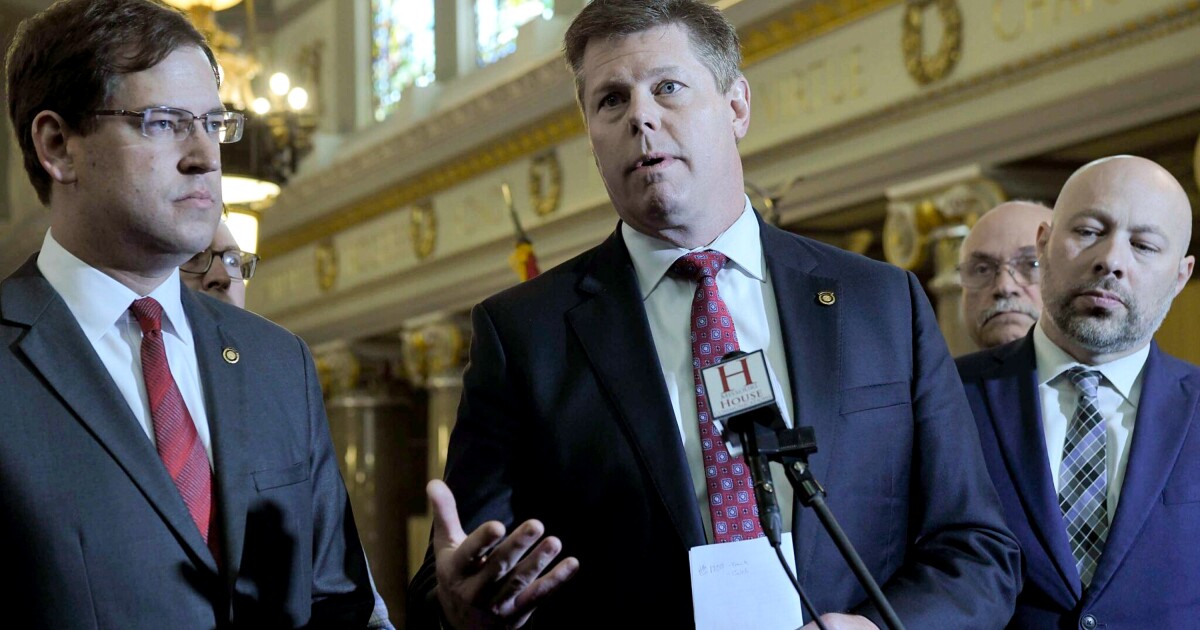Politics
Missouri advances bill to stop taking foster kids’ benefits

JEFFERSON CITY — The Missouri Senate gave initial approval Tuesday afternoon to legislation that would end the state’s practice of seizing Social Security benefits from foster children.The bill needs a final vote in the Senate before heading to the House.Wednesday morning, the House followed suit by unanimously approving its version of the bill and sending it to the Senate — providing two possible vehicles for the proposal to reach the governor’s desk.The state took at least $6.1 million in benefits from foster children last year — generally Social Security benefits for those with disabilities or whose parents have died. The money is used to reimburse the state for child welfare agency costs.It’s a decades-long practice that has come under increased scrutiny across the country over the last few years. Several states, including Arizona, New Mexico and Oregon, have stopped the practice.Under the legislation, Missouri could only use those funds to pay for the child’s “unmet needs” beyond what the state is obligated to pay, such as housing as the child prepares to age out of foster care. The state would also be required to ensure the account in which the child’s benefits are deposited is set up in a way that doesn’t interfere with federal asset limits.The legislation is sponsored by a pair of Republican state lawmakers: Sen. Holly Thompson Rehder of Scott City and Rep. Hannah Kelly of Mountain Grove.While there was no opposition voiced to the bill, it was hung up prior to legislative spring break earlier this month when numerous amendments were added and withdrawn.Rehder said she had been focused on working with senators to strip out amendments that might be outside the scope of the bill’s subject. Last year, legislation she sponsored to ban sleeping on public land was struck down by the state Supreme Court for failing that procedural requirement.The amendments that ended up included in the bill were thoroughly vetted, Rehder said, to make sure they fit under the title “relating to the care of the child.”Those include:Republican Sen. Rusty Black’samendment which would exempt licensed child care providers who care for only school-age children from certain compliance requirements; Republican Sen. Rick Brattin’samendment which would add considerations for judges when determining child custody;Democrat Sen. Doug Beck’s amendment which would prevent child custody in paternity action to a parent who has been found guilty or pled guilty to certain offenses when the child is a victim;Republican Sen. Andrew Koenig’s amendment which would require that Children’s Division, when possible, places foster children with families of the same religious faith as their biological parents or the child;And Rehder’s amendment which would forbid juvenile courts from refusing to reunify a parent utilizing medication-assisted treatment for substance use disorder with their child. Despite Rehder’s effort to rein in amendments, Republican state Sen. Mike Moon of Ash Grove raised procedural concerns that the bill still wasn’t narrowly tailored enough to pass the single subject requirement.“It’s not because I’m opposed to your effort,” Moon said, “it’s just my interpretation of what the constitution says.”Despite Moon’s concerns, the bill was approved by the Senate on a voice vote.Kelly said she’s been involved in foster care policy for years because her daughter came into her life through the foster care system.“This issue became part of my heart,” she said. “We have to make sure that we do what’s right by the kids.”And it’s not just a financial issue, she said.“For the kids who lost their biological parents, these benefits are in some cases the last tangible tie to your parents,” Kelly said. “It helps to create stability in the heart and mind. It’s just so hard for me to put into words, but it’s about more than the money.”This story originally was published in The Missouri Independent, part of the States Newsroom. The Independent’s Jason Hancock contributed to this story.
Politics
Police arrest anti-war protestors at Washington University
Hundreds of Washington University campus community members and local activists demanded the private university stop investing in Boeing during a Saturday protest because it supplies weapons to Israel. They also called for an end to the years-long war in Gaza where in recent months, thousands have died from Israeli bombardments following the Oct. 7 attack by Hamas fighters.”End the siege on Gaza now,” the group chanted as they marched around the campus before setting up an encampment at the school’s Tisch Park. “Stop the killing. Stop the slaughter. Gaza must have food and water.”Police from across the region responded to the demonstration and about five hours declared it an unlawful gathering. Law enforcement officers later arrested dozens of protestors at the campus, throwing some to the ground. Jill Stein, a Green Party presidential hopeful in town for a campaign event, was briefly detained and then released.A Washington University spokeswoman said she would have a comment on Saturday’s events at a later time.Students at St. Louis-area universities have called on their administrations to cut ties with Boeing for months because of their ties to Israel. “We are calling on the university to divest from genocide,” said Penelope Thaman, a sophomore who was part of the protest.The demonstration at Washington University is part of a wave of demonstrations on college campuses across the United States, some of which have been met with forceful police tactics to control crowds.In St. Louis, the students and activists expressed outrage at the school’s response to an April 13 pro-Palestinian gathering on campus where police arrested 12 protestors and gave them summons to appear in court. Wash U officials suspended three students on the grounds they disrupted an on-campus event.
Eric Lee
/
St. Louis Public RadioPro-Palestinian demonstrators march on Saturday at Washington University.
Freedom of expressionMore than 130 students, faculty and staff signed a letter to Washington University leaders earlier this week criticizing the university for allegedly infringing on students’ freedom of speech.“No matter where one stands on the ongoing violence against Gaza or whether Boeing is a good associate for the university, one should be concerned that the attacks on freedom of speech and academic freedom have increased significantly in our country and on this campus,” the letter’s authors wrote.Michael Allen, an architecture professor at the school, echoed the letter’s sentiment, while emphasizing Wash U students are attempting to share their beliefs and that they should be allowed to do so — despite what their viewpoint may be. “As faculty, I feel obligated to stand for freedom of expression on campus,” he said. ”We love our students, and we want to see them enjoy their right to free speech on this campus.”At Saturday’s protest, students said they were frustrated with administrators who don’t appear to be interested in what students are trying to tell people about the war in Gaza and the plight of Palestinians. The arrests and suspensions after the earlier protests made that clear, students said.“The fact that it has happened before proves that the administration is not really interested in listening to student voices about any of these concerns,” said Max Franks, a Wash U junior, during the protest. “The administration is interested in protecting its image and its bottom line. So if we hope to achieve anything, those are the things that we need to interfere with.”
Politics
Missouri House ethics rule fixes on mind amid Plocher probe

The saga of Dean Plocher took yet another twist this week, with the House speaker’s leadership team circumventing the chamber’s rules to try to force the ethics committee to hold a hearing.Plocher has been under investigation by the committee for months, and recently he and his allies have started demanding it convene and dismiss the complaint against him. But because House rules only allow the chair of a committee to schedule a hearing, the meeting scheduled by GOP leadership was quickly scuttled.“The reason why I canceled the meeting is because I didn’t notice it up,” said state Rep. Hannah Kelly, a Mountain View Republican appointed last year by Plocher to serve as ethics chair. She ultimately ended up scheduling a meeting for 11 a.m. Monday.Plocher wouldn’t comment Thursday on what his role was in the push to force a meeting.But the unusual maneuver, coming as the speaker is already being accused of obstructing the committee’s work, has added even more fuel to questions about whether the ethics rules in the House need to be reworked in order to deal with the possibility of the chamber’s most powerful member being the focus of an investigation.“It is deeply difficult to hold elected officials accountable in the process that we have in this ethics committee, particularly when we’re talking about the speaker, who appoints those members and ultimately has authority over how that committee works. Whether or not subpoenas are issued, you know, and the list goes on,” said House Minority Leader Crystal Quade, a Springfield Democrat.House Majority Leader Jon Patterson, a Lee’s Summit Republican set to take over as speaker next year when Plocher’s term expires, agreed that changes to the ethics rules in light of everything that’s been going on this year are “worth looking at.”“There’s always room to look at things,” he said earlier this week, “and see how they can be improved as we go forward.”Since late last year, the ethics committee has been digging into Plocher’s unsuccessful push for the House to sign an $800,000 contract with a private software company outside the normal bidding process; alleged threats of retaliation against nonpartisan legislative staff who raised red flags about that contract; purported firing a potential whistleblower; and years of false expense reports for travelalready paid for by his campaign.Over the course of the ethics committee’s inquiry, Plocher refused to speak to the private attorney hired to gather evidence and on three occasions over March and April refused to sign off on subpoena requests by the committee.Kelly and the committee’s vice chair, Democratic state Rep. Robert Sauls of Independence, also accused Plocher of undermining the inquiry by pressuring potential witnesses.Last week, the committee voted 6-2 to reject a report recommending a formal letter of disapproval for Plocher, that he hire an accounting professional to manage his expense reports moving forward and that he refrain from retaliation against any legislator or House employee who cooperated with the committee.The rejected report also includes numerous suggested changes to the rules governing the ethics committee process. Among the changes would be transferring subpoena power automatically to another member of House leadership — the speaker pro tem — if the speaker or anyone on his staff are subject of an inquiry.The report also suggests strengthening the House policy protecting legislative employees from unlawful harassment and clarifying that the committee can investigate any alleged obstruction of one of its investigations.
Jason Hancock
/
Missouri IndependentDavid Steelman speaks to reporters on Tuesday in Jefferson City. Steelman is an ex-member of the University of Missouri Board of Curators was hired by House Speaker Dean Plocher as his attorney.
Plocher has insisted he can’t say anything while the investigation is ongoing.“I can’t comment on anything on ethics,” he told reporters Thursday. “I just can’t comment.”But his attorneys have not been nearly as hesitant to weigh in on the speaker’s behalf.On Tuesday, one of those attorneys — former member of the University of Missouri Board of Curators David Steelman — said there was nothing at all wrong with the House ethics rules.The problem, Steelman contends, was that Kelly and the committee didn’t follow them.“The rules work fine if the committee chairman would have applied them,” Steelman told reporters. “It was not the procedure that didn’t work. It was the chairman who ignored the procedure. That didn’t work.”The committee should have dismissed the complaint at the start of its inquiry in November, Steelman said, and throughout the process the committee seemed to be ignoring its mission and digging for dirt.After rejecting the draft report last week, the ethics committee has held no other meetings. Steelman says the committee has no choice but to convene and finish its work.“Dean Plocher,” Steelman said, “has a right to a resolution.”As speaker, Plocher also has the power to approve — or refuse to approve — subpoenas issued by the committee. And three times, the speaker’s office informed the committee he would not be granting its request.Steelman said Tuesday that two of the requested subpoenas were for Plocher and his chief of staff, Rod Jetton. They both agreed to testify willingly, so no subpoenas were needed.As for other requests, after roughly a month of resistance, Plocher eventually recused himself, allowing Speaker Pro Tem Mike Henderson to sign off on some of the subpoenas.When, exactly, Plocher decided to recuse himself remains unclear.Asked why Plocher didn’t recuse himself from the start of the investigation, or at least when subpoena requests started showing up to his office, Steelman told reporters the speaker recused himself “when it mattered.”Steelman did not respond to an email seeking details on when, exactly, Plocher recused himself from the committee’s subpoena process.Plocher also has the power to take away Kelly’s position on the ethics committee. He declined to answer whether he was considering that when asked about it at a recent press conference.As for this week’s kerfuffle over committee hearings, Marc Powers, chief of staff for the House Democrats, said Sauls was approached by the speaker’s office about convening a hearing and informed them that only Kelly had the authority to do that.However, Powers said Sauls doesn’t object to having another hearing in order to close the investigation for good.Regardless of how the Plocher saga turns out, any rule changes will have to wait until next year.House rules are proposed at the beginning of a General Assembly, which convenes the January after Election Day, and voted on by the entire chamber. They govern the House for two legislative sessions.Quade, who is running for governor and in her final term in the House, said the allegations coming out of the ethics committee against Plocher “are deeply concerning.”“There are conversations around potential obstruction,” she said. “There are conversations around employee treatment. There’s a lot of concerning pieces in there.”She hopes those who return next year will make the issue a priority.“I do hope that the members who will remain after my time here will look at what is the most effective way to hold folks accountable,” she said, “when they are doing something that violates our code of ethics.”This story was originally published by The Missouri Independent, part of the States Newsroom.
Politics
Missouri Senate to debate $50 billion state budget next week
The Missouri Senate’s budget plan approved in a committee Wednesday has more money for workers who help people with developmental disabilities, more to help low-income families afford child care and more for counties to defray the cost of holding people convicted of felonies.There are also big new road projects and a boost to higher education funding.The committee did make some cuts to House-approved items, including slashing $2.5 million for schools to install artificial intelligence gun detection equipment and $10 million for medical research with psilocybin mushrooms to treat mental illness.Over two days, the Senate Appropriations Committee dug through thousands of individual lines as it prepared a spending plan for floor debate. Totals were not immediately available but the additions mean the Senate plan will be closer to Gov. Mike Parson’s $52.7 billion proposal than the $50.8 billion spending plan the House approved.The budget will be on the Senate floor next week. Final approval could prove difficult with the six-member Freedom Caucus promising extended debate by digging into every item added to the budget for the coming year.Republicans on the committee also injected a new issue into the budget at the end of Wednesday’s hearing – a provision, targeting Kansas City, that punishes any city declaring itself a sanctuary for undocumented immigrants with the loss of all state funding.Among the larger items added during the markup session are:$171 million to increase pay to at least $17 an hour for people helping adults with developmental disabilities in their daily lives. There is also $9 million to pay a $2 differential for night work.$80 million for reconstructing U.S. Highway 67 in Butler County. There is also $30 million for road improvements near a beef processing plant in Wright City and $48 million for improvements to U.S. Highway 65 between Buffalo and Warsaw.$5 million to increase payments to counties for jail time served by inmates who are later convicted of felonies and sent to state prisons. With $5 million added by the House, it would increase the per-day rate to $27.31 from the current $22.58, an amount that has not been increased since fiscal 2017. State law in effect since 1997 allows up to $37.50 per day but it has never been funded.Restored $25 million cut from child care subsidies for lower income families and set new rates based on the latest rate study. The House directed that a rate study produced for the 2021-22 fiscal year be used.Restored cuts the House made to Medicaid budget lines that pared back the amount set aside for anticipated cost increases. The restored money in Medicaid lines, and in other places in the budget, is to make sure departments can function until lawmakers can pass a supplemental spending bill next year, said state Sen. Lincoln Hough, a Republican from Springfield and chair of the appropriations committee“I don’t want any of those things running out of money while we’re not here,” he said.The money for developmental disability services will help diminish a waiting list, said Val Huhn, director of the Department of Mental Health. A boost in pay last year helped recruiting and the waiting list stopped growing, she said.“Our waitlist is kind of stagnant, but we’re not seeing an increase,” she said.Hough said he was disappointed last year that the full boost wasn’t possible.“It’s one of those things that takes a long time, and we ended up kind of with half of what I really wanted to do,” Hough said. “This was finishing off, more or less, a commitment from last year.”Another change made in the budget that won’t add costs is to take one employee from each of the state’s prisons and assign them to a centrally directed investigations unit. Their job will be to improve interdiction of contraband coming into the prisons.That has proven difficult and arrests of corrections officers in recent years for carrying drugs into prisons illustrates the issue. In one instance, a corrections officer brought drugs in soda cans and another brought rolls of paper soaked in synthetic cannabinoid.Trevor Foley, director of the Department of Corrections, said contraband gets into prisons in a variety of ways and catching it will also require a variety of approaches.“There’s prevention, there’s perimeter security, there’s searches, there’s body scanners, there’s pushing our perimeters back, there’s drone monitoring,” he said. “There’s staff reviews, there’s visitor reviews, there’s vendor and delivery screenings.”A wrongful death lawsuit filed earlier this month over a prisoner suicide describes the ease at which items can move from cell to cell even in the administrative segregation unit. Prisoners run strings that can move items as heavy as bed sheets from cell to cell. Sometimes goods are moved between floors, the lawsuit says, based on video obtained from the department.It is very difficult to catch those types of activities, Foley said.“I would need to triple my staff to have eyes watching every camera, even splitting them up by floors,” he said.As of Friday, there will be two weeks left for lawmakers to finish a budget before the constitutional deadline. The deadline has only been missed once, and legislative leaders expressed confidence they can meet it again, although it will be close.“Time is of the essence,” House Budget Committee Chairman Cody Smith said Thursday. “We do have enough time but certainly we are on the countdown.”Smith said he needs time to study the changes made by the Senate to determine which he can accept.‘I will reserve judgment until I understand what’s in the legislation,” Smith said. “I don’t think I really have a clear understanding of that.”This story was originally published by The Missouri Independent, part of the States Newsroom.
-

 Entertainment1 year ago
Entertainment1 year agoSt.Louis Man Sounds Just Like Whitley Hewsten, Plans on Performing At The Shayfitz Arena.
-

 Business1 year ago
Business1 year agoWe Live Here Auténtico! | The Hispanic Chamber | Community and Connection Central
-
Board Bills1 year ago
2022-2023 Board Bill 189 — Public Works and Improvement Program at the Airport
-

 Local News1 year ago
Local News1 year agoVIDEO: St. Louis Visitor Has Meltdown on TikTok Over Gunshots
-

 News1 year ago
News1 year agoTed Lasso-inspired pop-up bar now open in St. Louis
-

 Board Bills1 year ago
Board Bills1 year ago2022-2023 Board Bill 165 — Jefferson Arms Community Improvement District
-
Board Bills1 year ago
2022-2023 Board Bill 183 — Amending Ordinance Number 62885 known as the Capital Improvements Sales Tax
-
Board Bills1 year ago
2022-2023 Board Bill 180 — Right to Counsel for Tenants Facing Eviction





